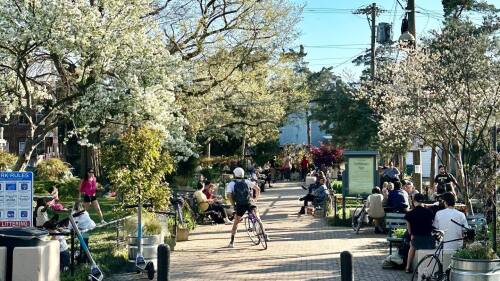Let’s talk about the cost of living in Richmond. The median household income in Richmond City is $65,650 according to the US Census Bureau. State-wise, Virginia is No. 11 in the country for median income at ~$50,383 per household. Okay, so we make a bit more than the state average.
From renting to buying groceries, how expensive is it to live in Richmond? Is it cheaper elsewhere? Let’s crunch the numbers.
Keep in mind: Statistics are subject to change.
Richmond’s cost vs. Arlington’s cost
Interested in seeing Richmond’s cost of living compared to cities in other states? We poked around on NerdWallet’s cost of living calculator, where you can put in any city along with your current pre-tax household income to find out what other cities you could afford to live in.
We looked at the cost of living in Richmond compared to Arlington, VA. Here’s what we found:
- Income: If you make $50,000 in Richmond, you’d need to make $71,338 for a similar lifestyle in Arlington.
- Housing: Costs are 149% higher in Arlington. The median rent for a two-bedroom is $2,867 in Arlington, compared to $1,363 in Richmond.
- Gas: If you moved to Arlington, you’d pay 3% more for a gallon of gas, which averages $3.55.
- Food: You’d pay 13% more on groceries and dining out in Arlington.
Richmond’s cost vs. Charlottesville’s cost
A bit closer to home, Charlottesville, VA, lands closer to Richmond’s averages.
- Income: If you make $50,000 in Richmond, you’d need to make $54,320 for a similar lifestyle in Charlottesville.
- Housing: is 29% higher in Charlottesville. The median rent for a two-bedroom is $1,488 in Charlottesville, representing a $125 higher average.
- Gas: If you moved to Charlottesville, you’d pay 3% less on a gallon of gas.
- Food: You’d pay 1% less on groceries and dining out in Charlottesville.
How much is rent in Richmond?
We used Zillow to find average rental costs in Richmond compared to state averages.
- One-bedroom: The average rental price in Richmond is $1,350, compared to the state’s average of $1,524.
- Three-bedroom: The average rental price in Richmond is $2,300 per month, and the state average is $2,400.
Now let’s look at buying houses. Zillow calculates Richmond’s average home value at $372,574, up 1.2% over the past year. The state average is $408,459, up 2.6% over the past year.
Time for a breather. Scouring the numbers can feel daunting, but keep in mind that there are people in Richmond working toward better housing futures, like Urban Hope, which is currently developing affordable housing models in Richmond’s East End.
How much do groceries cost?
Your grocery bill will vary based on your family size and dietary needs, but we can give you a sense of what you’ll be spending in the checkout line with the crowdsourcing site Numbeo. On average, a gallon of milk will cost you about $3.55 in Richmond and a gallon of milk averages at $4.01.
How much does it cost to dine out in Richmond? If you’re stopping by any regular-degular local haunt, your meal will cost $20 on average, which lines up with the national average.
Want to save on produce? Put your green thumb to the test at a community garden near you.
How much does daycare cost?
If you have a family, you need to know how much childcare costs in Richmond. Full-day private preschool averages $1,288 per month, which is just beneath the national average of $1,373.
How much does healthcare cost?
According to NerdWallet, the average doctor’s visit will cost $134.10 in Richmond. Don’t forget the dentist — those visits average at $103.50. Also note that the cost of Lipitor here averages at $500.93 (around $60 more than Arlington + $70 more than Charlottesville).
In Richmond, we have access to a substantial healthcare system, but according to the US Census Bureau, 8.5% of the population does not have healthcare coverage. Health insurance costs vary based on factors like age and plan, but an individual plan tends to cost between $400 and $600 per month.
How much do transportation and gas cost?
According to last month’s average, most folks in Richmond get around by car, and drivers will likely pay $3.05 per gallon of gas. If you’re taking the bus, you’ll be riding The Pulse, which is free of cost.
It’s worth noting that our walk score is 51 out of 100, in case you prefer to get around on foot. While we’re on the subject, we have a few more ideas for eco-friendly transit in Richmond.
















